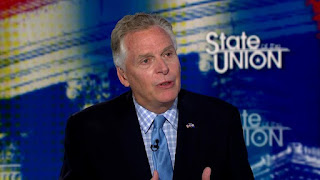Bari Weiss tells Brian Stelter how 'the world has gone mad,' lists 'people who work at' CNN as a cause
Former New York Times journalist Bari Weiss confronted CNN’s Brian Stelter about his network’s coverage of the COVID-19 lab leak theory when listing examples of why the world has gone mad during Sunday’s edition of "Reliable Sources."
Weiss has written that many Americans "feel the world has gone mad," so the left-wing CNN host asked her what she meant by that comment.
"Where can I start? Well, when you have the chief reporter on the beat of COVID for The New York Times talking about how questioning or pursuing the question of the lab leak is racist, the world has gone mad. When you're not able to say out loud and in public there are differences between men and women, the world has gone mad. When we’re not allowed to acknowledge that rioting is rioting and it is bad and that silence is not violence, but violence is violence, the world has gone mad," Weiss said. "When you're not able to say the Hunter Biden laptop is a story worth pursuing, the world has gone mad. When, in the name of progress, young school children, as young as kindergarten, are being separated in public schools because of their race, and that is called progress instead of segregation, the world has gone mad. There are dozens of examples."
Stelter then asked, "Who's the people stopping the conversation?"
Weiss responded with a jab at CNN.
"People who work at networks, frankly, like the one I'm speaking on right now, to say it was racist to investigate the lab leak theory," Weiss said.
It was unclear who Weiss was referring to with her remark, although the narrative that the coronavirus may have leaked from a Wuhan lab was widely ridiculed by CNN and other media outlets before gaining mainstream credence this year. CNN medical contributor Dr. Leana Wen remarked in June that any investigation of the lab theory shouldn't lead to anti-Asian discrimination.
Stelter, who typically defends his network at all costs and spent much of 2021 downplaying journalism ethics violations made by embattled colleague Chris Cuomo, wanted to know which of his co-workers Weiss was referring to.
"Who said that at CNN? When you say ‘allowed,’ it’s a provocative thing to say," Stelter said. "You say we're not allowed to talk about these things but they’re all over the Internet ... I've heard about every story that you've mentioned. So, I’m just suggesting, of course people are allowed to cover whatever they want to cover."
Weiss fired back, "But you and I both know that it would be delusional to claim otherwise that touching your finger to an increasing number of subjects that have been deemed third rail by the mainstream institutions and increasingly by some of the tech companies will lead to reputational damage, perhaps you losing your job, your children sometimes being demonized as well, so what happens is a kind of internal self-censorship."

